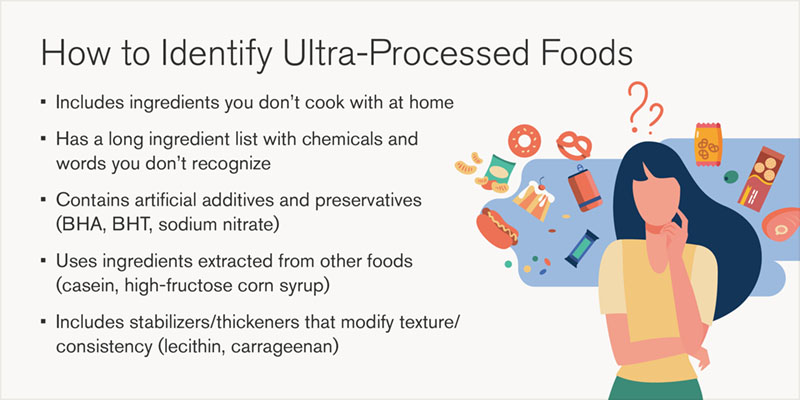Understanding Ultra-Processed Foods: How They Affect Your Health and What You Can Do About It
April 7, 2025
Categories: Health & Wellness
Tags: Nutritionist, obesity
 By Elizabeth Clay, APRN, Internal Medicine
By Elizabeth Clay, APRN, Internal Medicine
In our fast-paced world, convenience often wins over health when it comes to food choices. Ultra-processed foods are a significant part of many people's diets. While these foods offer convenience, taste, and affordability, their frequent consumption poses real concerns for our long-term health.
Understanding what ultra-processed foods are, recognizing their potential dangers, and learning practical ways to reduce their impact on our lives can lead to meaningful health improvements.
What are ultra-processed foods?
Ultra-processed foods are characterized by extensive industrial processing that alters them significantly from their natural state and contain a number of added artificial ingredients.
They contain a long list of added ingredients and are often engineered for taste and long shelf life. Ultra-processed foods contribute to nearly half of our daily calories and are best consumed in moderation.
"Ultra-processed foods are stripped of their nutritional value and often contain ingredients that are not typically found in your kitchen at home, like artificial flavors, sweeteners, emulsifiers, and dyes," says Elizabeth Clay, a Nurse Practitioner at Loyola Medicine.
Examples of ultra-processed foods include:
- Packaged snacks – cookies, chips
- Sugary beverages – soda, energy drinks
- Convenient frozen meals – pizzas, chicken nuggets
- Breakfast items – cereal, breakfast bars, flavored yogurts
While appealing and convenient, these foods are lack the essential nutrients needed to support good health compared to foods prepared from fresh, whole ingredients.
How do ultra-processed foods differ from processed foods?
Processed foods have simple ingredients like oil, salt, or sugar added but remain relatively close to their original form. While modified for convenience, they offer nutritional benefits and can be part of a balanced diet. Not everything that comes in a package is bad for you!
While "processed foods" is a broad category encompassing anything altered from its natural form, such as pasteurized milk, canned beans, or frozen vegetables, ultra-processed foods go beyond simple preservation or minimal processing.
Ultra-processed foods undergo significant industrial modifications, often combining substances extracted from food (like sugars and oils), synthesized ingredients, and additives that are rarely used in home-cooked meals. In contrast, minimally processed typically maintain their nutritional value and can support a healthy diet.
What are whole or minimally processed foods?
Whole or minimally processed foods remain as close to their natural state as possible. They include fresh vegetables, fruits, whole grains, legumes, nuts, meats, seafood, eggs, dairy, herbs, and spices. Prioritizing these real, unaltered foods as the foundation of your diet supports better health.

Health complications linked to ultra-processed foods
Regularly consuming ultra-processed foods can significantly impact your health. Because ultra-processed foods contain excess sugar, salt, unhealthy fats, and added calories, frequent intake of these foods has been strongly linked to obesity and related chronic diseases. Obesity, driven primarily by excessive caloric intake, dramatically raises the risk of type 2 diabetes, cardiovascular disease, and even certain cancers. High sodium levels can lead to hypertension, increasing heart attack and stroke risks, while high sugar content directly contributes to insulin resistance and diabetes.
“Because they are void of essential nutrients and often high in sugar, sodium, and saturated fat, they can lead to chronic inflammation, which can increase risk for a multitude of health issues," says Ms. Clay.
Moreover, ultra-processed foods often lack dietary fiber, essential for maintaining healthy digestion and a balanced gut microbiome. A lack of fiber can lead to chronic digestive issues such as constipation, bloating, and even contribute to conditions like irritable bowel syndrome (IBS). The absence of fiber and essential nutrients also disrupts gut health, potentially leading to chronic inflammation. Persistent inflammation is linked to numerous chronic diseases, including arthritis, inflammatory bowel disease, and even cognitive decline.
How ultra-processed foods affect your health
When ultra-processed foods make up the majority of a diet, our bodies can experience unfavorable health consequences. Regular checkups and blood tests can help keep us focused on taking steps toward better health. Key indicators to watch include:
- Frequent cravings for sweet or salty snacks: Regular cravings could indicate dependence on ultra-processed foods, potentially signaling inadequate nutrient intake elsewhere.
- Rapid weight gain: Excessive caloric intake without sufficient nutrient density often leads to unintended weight gain.
- Digestive discomfort: Regular bloating, constipation, or discomfort may signal insufficient fiber intake.
- Elevated blood pressure and cholesterol levels: Routine medical check-ups can detect these issues early, allowing you to take preventative action.
- Increased blood sugar levels: Regular blood tests can identify pre-diabetic conditions, prompting timely dietary adjustments.
“If you’re looking at a food label and there’s more than five ingredients and you don’t recognize them—some long word that you cannot buy at the store or you cannot find in your kitchen—then most likely, you want to stay away from it," says Ms. Clay.
Daily activities to maintain health
Incorporating daily healthy activities can significantly counteract some risks associated with consuming ultra-processed foods:
- Regular exercise: Engaging in at least 30 minutes of moderate physical activity daily helps maintain a healthy weight, improves cardiovascular health, and enhances insulin sensitivity.
- Stay hydrated: Drinking plenty of water supports digestion, flushes toxins from the body, and can prevent overeating by creating a sense of fullness.
- Mindful eating: Paying attention to portion sizes and eating without distractions can help prevent excessive intake of calorie-dense ultra-processed foods.
- Include fiber-rich foods: Aim to incorporate fiber-rich foods like fruits, vegetables, whole grains, and legumes daily to improve digestive health and reduce inflammation.
How to eat less ultra-processed foods
Reducing your intake of ultra-processed foods doesn't require drastic measures, but rather intentional, manageable steps.
“The biggest impact is cooking more of your food at home. It’s easier said than done because ultra-processed foods are convenient, and everyone’s so busy, but trying to cook more when you can, using more whole ingredients, really helps," says Ms. Clay.
Try these strategies to eat heathier:
- Cook more at home: Home-cooked meals allow control over ingredients, reducing the intake of harmful additives and unnecessary sugars.
- Meal prep: Set aside time weekly to plan and prepare healthy meals. Pre-prepared meals and snacks minimize reliance on convenient ultra-processed foods during busy weekdays.
- Read nutrition labels: Become familiar with ingredients lists and nutritional information. Choose products with fewer ingredients and recognizable, whole-food-based ingredients.
- Shop the perimeter: Focus your grocery shopping around the store's perimeter, where fresh produce, meats, dairy, and whole foods are typically located, reducing your exposure to tempting ultra-processed items.
- Gradual substitutions: Instead of eliminating favorite processed foods altogether, gradually replace them with healthier alternatives. For instance, choose whole-grain bread over white bread, fresh fruit instead of sugary snacks, or homemade smoothies instead of sugary beverages.
“Instead of focusing on cutting things out, I like to focus on adding things in. For example, start eating an apple a day, or have a cup of berries with breakfast. Small changes like these can replace ultra-processed foods naturally over time," says Ms. Clay.
By gradually incorporating these strategies, you can effectively reduce your reliance on ultra-processed foods, leading to better health outcomes and increased overall well-being. Remember, even small changes can lead to significant long-term health benefits.
Elizabeth Clay, FNP-C, is a nurse practitioner with a strong background in clinical care, patient education, and public health. With experience in both acute and outpatient settings, she specializes in providing evidence-based guidance on nutrition, wellness, and chronic disease prevention. Elizabeth is passionate about empowering individuals to make informed health choices, particularly regarding diet and lifestyle.
Book an appointment today to see Elizabeth Clay, FNP-C, or another Family Medicine specialist by self-scheduling an in-person or virtual appointment using myLoyola.
